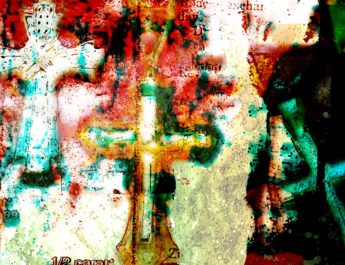Genesis 15:1-6
Ordinary C37
1 After these thingsI the wordII of the LordIII cameIV to AbramV in a vision,VI
I “things” = dabar. From dabar (to speak, declare, discuss). This is speech, a word, a matter, an affair, charge, command, message, promise, purpose, report, request. It is a word, which implies things that are spoken of in a wide sense.
II “word” = dabar. Same as “things” in v1. See note I above.
III “Lord” = YHVH. Related to “came” in v1. From havah (to be, become) or hayah (see note IV below). This is the name of the God of Israel, the self-existent and eternal one, the tetragrammaton. This pronunciation has been lost to time so “Lord” is generally used in its place.
IV “came” = hayah. This is to be or become, to happen.
V “Abram” = Abram. From the same as Abiram (exalted father, a high father – lofty) {from ab (father literal or figurative) + rum (rise, bring up, being high, extol, exalt, haughty; to raise in a literal or figurative sense)}. This is Abram, exalted father.
VI “vision” = machazeh. 4x in OT. From chazah ((to gaze at – to see or behold; perceiving as a mental process or looking at something with pleasure; seeing a vision). This is a vision.
“Do not be afraid,VII Abram, I am your shield;VIII your rewardIX shall be very great.”X
VII “be afraid” = yare. This is to fear, be afraid, dreadful. It can also refer to fearful reverence – to fear in a moral sense is to say to revere, respect.
VIII “shield” = magen. From ganan (to surround, cover, defend, protect). This is a shield, defense, or figuratively a protector. It can also be used for a crocodile’s hide.
IX “reward” = sakar. From sakar (to hire, reward, earn). This is wages, payment, service, salary, worth, reward, or benefit.
X “great” = rabah. This is increasing in any aspect whether quantity, authority, size, quality, greatness, etc.
2 But Abram said, “O LordXI God,XII what will you give me, for I continueXIII childless,XIV
XI “Lord” = Adonai. From adon (lord, master, owner); root means to rule or be sovereign. This is the actual Hebrew word for Lord used (in a different form) of humans and (in the present form) of God. It means someone who is in control.
XII “God” = YHVH. Same as “Lord” in v1. See note III above.
XIII “continue” = halak. This is go, come, walk. It is walk literally and figuratively and includes people and animals. It can be used figuratively for one’s moral life – how we walk according to God’s way or against it. It can also refer to the walk of life as in the course one’s life takes, the choices we make, etc.
XIV “childless” = ariri. 4x in OT. From arar (to bare, strip, be razed, break). This is stripped or bare in the sense of lacking children.
and the heirXV of my houseXVI is EliezerXVII of Damascus?”XVIII
XV “heir” = ben + mesheq. Ben is from banah (to build or obtain children). This is son, age, child. It is son in a literal or figurative sense. Mesheq is 1x in OT. Its root may mean to hold. It is a possession or an heir. It can also refer to one’s steward.
XVI “house” = bayit. Related to “heir” in v2. Probably from banah (see note XV above). This is house, court, family, palace, temple.
XVII “Eliezer” = Eliezer. 14x in OT. From el (God, a god) + ezer (help, aid, helper); {from azar (to help, protect, support, ally; properly, to surround so as to provide aid)}. This is Eliezer, meaning “God is help” or “God of help.” It is the name of several people.
XVIII “Damascus” = Dammeseq. From Old Aramaic dammasq (Damascus); perhaps related to d-r (dwelling) OR in Syriac darsuq (“a well-watered land”). This is Damascus. See https://en.wikipedia.org/wiki/Damascus.
3 And Abram said, “XIXYou have given me no offspring,XX and soXXI a slaveXXII born in my house is to be my heir.”XXIII
XIX {untranslated} = hen. This is a remark of surprise or excitement: lo! Behold! It can also mean if or though.
XX “offspring” = zera. From zara (to sow or scatter seed; conceive or yield). This is seed or sowing. It can, thus, mean a fruit, plant, sowing time, child, offspring, or posterity.
XXI “so” = hinneh. Related to {untranslated} in v3. From hen (see note XIX above). From hen (lo! Behold! If, though; an expression of surprise). This is to draw attention, show suddenness or surprise, or to emphasize the importance of the coming statement. See! Lo! Behold!
XXII “slave” = ben. Same as “heir” in v2. See note XV above.
XXIII “is to be…heir” = yarash. This is inheriting or dispossessing. It refers to occupying or colonizing – taking territory by driving out the previous inhabitants and living there instead of them. By implication, it can mean to seize or rob, to expel, ruin, or impoverish.
4 ButXXIV the word of the LordXXV came to him, “This man shall not be your heir; no one but your very ownXXVI issueXXVII shall be your heir.”
XXIV {untranslated} = hinneh. Same as “so” in v3. See note XXI above.
XXV “Lord” = YHVH. Same as “Lord” in v1. See note III above.
XXVI “own” = meeh. This is inward parts, belly, heart, womb, intestines, vastness. It can also be figurative for sympathy.
XXVII “issue” = yatsa. This is to go or come out, bring forth, appear. It is to go out in a literal or figurative sense.
5 He broughtXXVIII him outsideXXIX and said, “LookXXX, XXXI
XXVIII “brought” = yatsa. Same as “issue” in v4. See note XXVII above.
XXIX “outside” = chuts. Root may mean to sever. So, this is something that is separated by a wall – the outside, the street, a field, highway, or abroad.
XXX “look” = nabat. This is to behold, look at intently, consider, or scan. It can mean to have respect or regard someone favorably.
XXXI {untranslated} = na. This particle is used for requests or for urging. It can be we pray, now, I ask you, oh. This is the same “na” in “hosanna.”
toward heavenXXXII and countXXXIII the stars,XXXIV if you are ableXXXV to count them.” Then he said to him, “So shall your descendantsXXXVI be.”
XXXII “heaven” = shamayim. Root may mean being lofty. This is sky, the air, or heaven. It is in a dual noun form so this might refer to the part of the sky where the clouds move on the one hand and the part beyond that where the sun, moon, and stars are on the other hand.
XXXIII “count” = saphar. From sepher (writing, document, book, evidence). This is properly to tally or record something. It can be enumerate, recount, number, celebrate, or declare.
XXXIV “stars” = kokab. Perhaps from the same as kavah (to prick, blister, burn, scorch). This is a star as shining, stargaze. Figuratively, can mean prince.
XXXV “are able” = yakol. This is to be able, endure, overcome, prevail.
XXXVI “descendants” = zera. Same as “offspring” in v3. See note XX above.
6 And he believedXXXVII the Lord;XXXVIII and the Lord reckonedXXXIX it to him as righteousness.XL
XXXVII “believed” = aman. This is to believe, endure, fulfill, confirm, support, be faithful. It is to put one’s trust in, be steadfast. Figuratively, this is to be firm, steadfast, or faithful, trusting, believing, being permanent, morally solid. This is where the word “amen” comes from.
XXXVIII “Lord” = YHVH. Same as “Lord” in v1. See note III above.
XXXIX “reckoned” = chashab. This is properly to braid or interpenetrate. Literally it is to create or to wear. Figuratively, it can mean plotting – generally in a negative sense. More broadly, this can also mean think, consider, or make account of.
XL “righteousness” = tsedaqah. From the same as tsedeq (rightness, righteousness, vindication. It is everything that is just or ethical. That which is right in a natural, moral, or legal sense. It also includes just weights (i.e. true weights). Figuratively, this is justice, righteousness, equity – even prosperity). This is righteousness, justice, righteous acts, and moral virtue.
Image credit: “God Promises Abram” by YoMnistry by John Paul Stanley.




